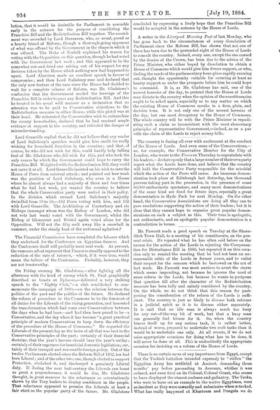A writer in the Liverpool Morning Post of last Monday,
who has gone back to the circumstances of every dissolution of Parliament since the Reform Bill, has shown that not one of these has been due to the pretended right of the House of Lords to consult the country. Indeed, every one, except the one caused by the demise of the Crown, has been due to the advice of the Prime Minister, who either hoped by dissolution to obtain a House of Commons which would give him firmer support, or who,. finding the sands of the parliamentary hour-glass rapidly running- out, thought the opportunity suitable for securing at least as hearty support as under the prospects before him he could hope to command. It is, as Mr. Gladstone has said, one of the newest heresies of the day, to pretend that the House of Lords may dictate to the country when the opinion of the constituencies• ought to be asked again, especially as to any matter on which the existing House of Commons speaks in a firm, plain, and decisive tone. It is not only one of the newest heresies of the day, but one most derogatory to the House of Commons. The whole country will be with the Prime Minister in repudi- ating such a claim as inconsistent with the most elementary principles of representative Government,—indeed, as on a par with the claim of the Lords to reject money-bills.


































 Previous page
Previous page